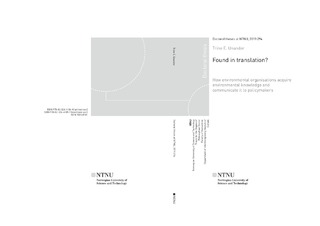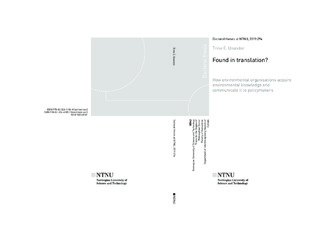| dc.contributor.advisor | Sørensen, Knut Holtan | |
| dc.contributor.advisor | Aune, Margrethe | |
| dc.contributor.advisor | Levold, Nora | |
| dc.contributor.author | Unander, Trine E. | |
| dc.date.accessioned | 2020-02-03T12:40:20Z | |
| dc.date.available | 2020-02-03T12:40:20Z | |
| dc.date.issued | 2019 | |
| dc.identifier.isbn | 978-82-326-4185-7 | |
| dc.identifier.issn | 1503-8181 | |
| dc.identifier.uri | http://hdl.handle.net/11250/2639304 | |
| dc.description.abstract | Sammendrag
Denne avhandlingen omhandler rollen miljøorganisasjoner spiller i miljøpolitisk læring. Begrepet ‘politisk læring’ kan defineres som den kognitive og sosiale dynamikken som er involvert når politiske aktører, for å nå politiske mål, tilegner seg, transformerer og tar i bruk ny informasjon og kunnskap med den hensikt å ta beslutninger og endre politiske oppfatninger.
Mer spesifikt har målet med studien vært å gi en bedre forståelse av hvordan miljøorganisasjonene jobber for å påvirke miljøpolitikk gjennom å presentere kunnskap for Stortingspolitikere og forvaltning. Problemstillingen blir undersøkt fra perspektivet til både politikere, ansatte i forvaltning og aktører i miljøbevegelsen. Sentrale spørsmål har vært hvilken type og form for kunnskap som beveger seg mellom de involverte aktørene, i hvilke ‘kommunikasjonsrom’ kunnskapsformidlingen foregår og hvordan beslutningstakerne tar imot aktørene i miljøbevegelsen.
Studien viser hvordan miljøorganisasjonene arbeider når de former og oversetter verdier og kunnskap, eller ‘factisher’, til beslutningstakere og hva som gir organisasjonene den posisjonen de har i politikk og forvaltning. Organisasjonene ser ut til å ha ferdigheter som plasserer dem i en fordelaktig posisjon for å kunne gi innspill til miljøpolitisk læring blant beslutningstakere. Dette ser ut til å skyldes 1) deres evne til å tilegne seg kunnskap på en ‘rhizomisk’ måte 2) den presise relevansen av det de foretar seg i de mange kommunikasjonsrommene de benytter seg av, og 3) deres ferdigheter innen samhandlingsekspertise i det politiske systemet blant Stortingspolitikere og embetsmenn. Ved å kombinere ferdigheter innen disse feltene ser det ut til at miljøorganisasjonene klarer å gjøre seg synlige, interessante og nyttige for de beslutningstakerne de prøver å påvirke.
Avhandlingen undersøker primært kunnskapsinnhentings- og kommunikasjonsprosessene og ikke politiske resultater. Det overordnede formålet er altså å belyse hvordan kunnskap erverves av miljøorganisasjoner i Norge og hvordan denne kunnskapen så formidles til beslutningstakere. | nb_NO |
| dc.description.abstract | Summary
This thesis concerns the role of environmental non-governmental organisations (ENGOs) in environmental policy learning. The concept of policy learning is used to designate broadly the cognitive and social dynamics involved when policy actors, to reach political goals, acquire, transform and enact new information and knowledge to make decisions and change policy-related beliefs.
More specifically, the ambition of the study has been to get a better understanding of how the ENGOs work to influence environmental policymaking by presenting knowledge to policymakers. The issue is investigated from the perspectives of both policymakers and ENGO actors. Central questions have been which type and form of knowledge moves between the involved actors, in which ‘communication spaces’ the knowledge mediation takes place and how the policymakers meet the ENGO actors. I have examined how the ENGOs work when they translate interests and knowledge or factishes to policymakers and what gives the ENGOs the position they hold among policymakers.
The study has shown that the ENGOs seem to hold skills that place them in an advantageous position to provide input to policy learning among policymakers. This is due to their proficiencies with respect to 1) a rhizomic way of learning or acquiring knowledge; 2) to precise relevance of actions staged in a number of communication spaces configured in various ways; and 3) to their proficiencies at employing interactional expertise within the political system among Members of Parliament and civil servants. Through intertwining skills within these fields, the ENGOs seemed to be able to make themselves visible, interesting and useful to the policymakers they try to influence.
The main emphasis of the thesis is on the processes of knowledge acquisition and communication rather than on policy outcomes. The overall purpose is to shed light on the ways in which knowledge is acquired by ENGOs in Norway and how it is communicated to policymakers. | nb_NO |
| dc.language.iso | eng | nb_NO |
| dc.publisher | NTNU | nb_NO |
| dc.relation.ispartofseries | Doctoral theses at NTNU;2019:294 | |
| dc.relation.haspart | Paper 1:
Unander, Trine, Sørensen, Knut Holtan.
Rhizomic learning: How environmental
non-governmental organisations (ENGOs)
acquire and assemble knowledge
- The final published version is available at
https://doi.org/10.1177/0306312720908343 | |
| dc.relation.haspart | Paper 2:
Unander, Trine E; Sørensen, Knut H.
Engaging policymakers through
environmental communication.
Environmental non-governmental
organisations (ENGOs) and their use of
communication spaces | |
| dc.relation.haspart | Paper 3:
Epistemic cultures in environmental
policymaking: How policy actors warrant
and utilise the expertise of environmental
non-governmental organisations (ENGOs) | |
| dc.title | Found in translation? How environmental organisations acquire environmental knowledge and communicate it to policymakers | nb_NO |
| dc.type | Doctoral thesis | nb_NO |
| dc.subject.nsi | VDP::Humanities: 000::Cultural science: 060 | nb_NO |

